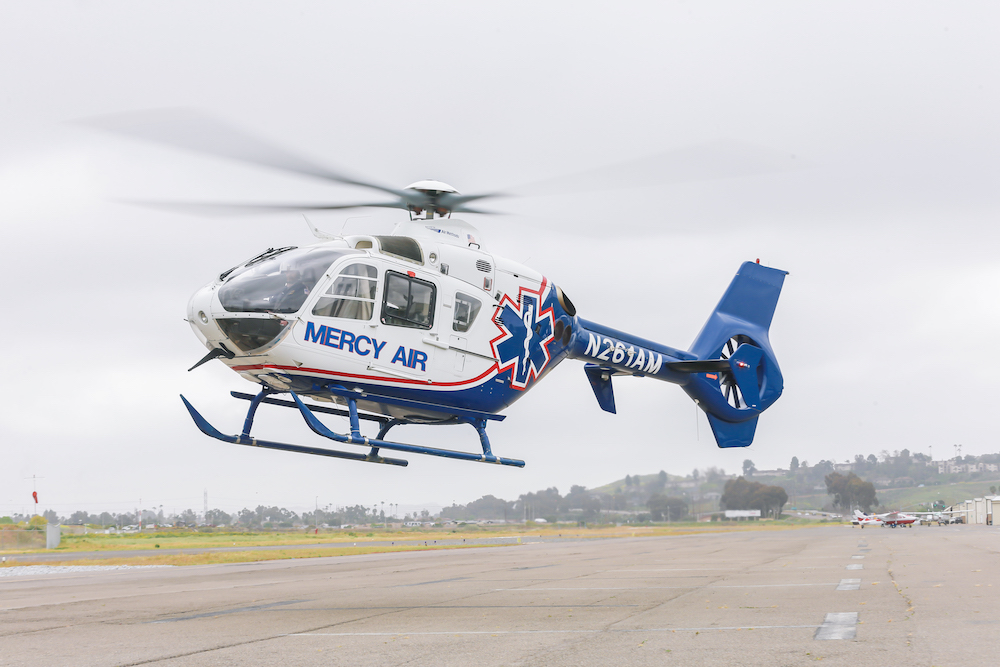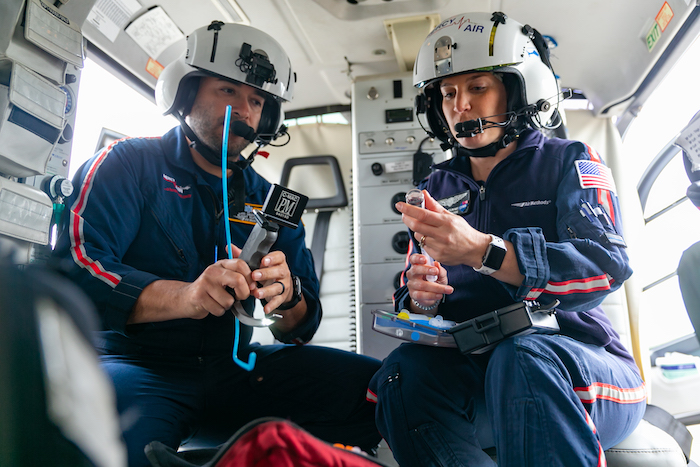February 12, 2020

Air Methods—better known as Mercy Air and Skylife in California—leads the air-medical industry with its new “No Membership Required” programming that reduces the expense for patients in need of their critical care services.
Today we spotlight Air Methods, our partner in education. Air Methods—which operates as Mercy Air and Skylife in California—believes that everyone deserves access to lifesaving care via their highly trained critical care clinicians, without the stress of navigating unreasonable costs after the fact. We support them in this mission and admire their commitment to patient advocacy, education, and research.
EMS providers know that there are times when the difference between life and death is measured in minutes. Multisystem trauma, heart attack, stroke, and neonatal emergencies are just a few of the situations where the use of air-medical transport ensures that patients get the care they need in the timeframe required to save their life. Unfortunately for some patients, this has historically led to high out-of-pocket bills—the result of air ambulance providers typically being out-of-network with insurers.
Some air ambulance services offer membership-based programs. Members of their programs have all costs covered if they require treatment and transport. However, most people do not plan for a car accident, heart attack, or stroke. And yet, these people deserve important lifesaving air-medical care when these emergencies do occur—and without life-changing bills. Adding to the issues of membership programs, patients with Medi-Cal coverage cannot receive a bill for these services and get no benefit from such a program. This redundancy is often not well communicated in air-medical marketing programs.
Enter Air Methods, the national air-medical leader with over 300 bases serving 48 states. Air Methods believes everyone deserves access to lifesaving care, and that no membership should be required to guarantee low out-of-pocket costs. To this end, Air Methods has developed its No Membership Required program and patient advocacy services.
Air Methods’ no membership program has resulted in agreements with large health insurance companies in more than 20 states, with plans to increase these agreements and go in-network in all areas they serve. Patients under these plans see little to no balance bills. For patients that are not yet in-network, the company offers its patient advocacy services, where company representatives help patients and their families work with their insurers to navigate the billing process. Lastly, Air Methods has developed a robust financial assistance program. By fostering community partnerships, Air Methods created a charitable fund designed to offset the portion of emergency medical treatment not covered by a patient’s insurance.
Through their focus on patient advocacy and financial assistance, an Air Methods patient with Medicare pays an average of just $280 in out-of-pocket expenses. Patients with private insurance also see similar levels of cost.

Air Methods flight paramedics, nurses, and physicians bring an immense skillset and knowledge base to any 9-1-1 incident or interfacility transport. This value is the direct result of heavy investment in training, equipment, and resources.
This incredibly low cost is impressive in the context of the critical services provided by Air Methods’ excellent clinicians. The company’s standards for initial employment are high, and the company maintains important provider competencies through considerable investment in continuing education and training for all crewmembers throughout their career.
Air Methods clinicians are taught by industry-leading paramedics, nurses, and physicians. The company supports this educational effort with sophisticated facilities equipped with high-fidelity simulation technology. All of this prepares the flight crews to care for infants, pediatrics, high-risk OB patients, as well as standard adult patients at a high level.
Air Methods clinicians also have access to frequent physician-led cadaver labs, empowering flight crews with the confidence to perform lifesaving procedures such as endotracheal intubation, surgical cricothyrotomy, needle thoracostomy, and escharotomy. These investments directly benefit their patients. For example, Air Methods’ first-attempt tracheal tube intubation rate consistently exceeds 90% – nearly 20% better than the average EMS success-rate.
Air Methods further supports its highly-trained clinicians with industry-leading equipment and resources, such as cutting-edge ventilators, balloon pumps, and impella devices. The company also recently launched a blood product program. Currently, 98 bases have the ability to deliver blood products to patients in the field and during transport, an intervention that is critical to survival for patients who have sustained significant trauma.
Air Methods also works to drive the out-of-hospital care industry forward through a dynamic and well-developed quality assurance (QA) and research program. They maintain a 100% QA of patient transports, ensuring active guidance for the clinical team, adherence to national patient care guidelines, and an ability to adapt future clinician practice for better patient outcomes.
Air Methods derives powerful statistical research from its large, nationwide operations. It then uses this data to establish evidence-based best practices that influence clinical decisions throughout the industry. They are the only non-hospital based air medical company to have an Institutional Review Board Accreditation completed and renewed through 2021. With 26 current clinical research projects, Air Methods has established itself as an active participant and leader in evidence-based medicine.
Established in 1980, Air Methods began with a single helicopter and a hospital contract in Colorado. To date, Air Methods conducts over 100,000 patient transports per year and employs over 4,500 team members. Their commitment to safety, education, and patient advocacy make them an industry leader in the air-medical transport arena.
The California Paramedic Foundation is proud to partner with Air Methods and supports their efforts to deliver financially reasonable, top-quality air medical care and transport to patients throughout California.


